Presentation: Cross Border Trucking Information
3/11/2008
Slide 1:
All 22 Congressional Safety Mandates Have Been Met
- Established mandatory pre-authority safety audits.
- Conducted at least 50 percent (100) of the safety audits on-site in Mexico.
- Issued permanent operating authority only to Mexican trucking companies who pass safety compliance review.
- Conducted at least 50 percent (100) of the compliance reviews on-site in Mexico - including any who did not receive an on-site pre-authority audit.
- Checked the validity of the driver’s license every time a truck crossed the border.
- Assigned Mexican truck companies a distinct DOT number.
- Ensured that all trucks from Mexico displayed a CVSA decal. DOT Validated the decal with a check of all trucks from Mexico that do not display a current CVSA decal.
- Had state inspectors in the border states report any violations of safety regulations by trucks from Mexico to the U.S. federal authorities.
- Equiped all U.S.-Mexico commercial border crossings with weight scales - including weigh-in-motion (WIM) systems at 5 of the 10 busiest crossings.
- Studied the need for weigh-in-motion (WIM) systems at all other border crossings.
- Collected proof of insurance by a U.S. certified insurance carrier from Mexican companies who want to operate beyond the border zone.
- Limited trucks from Mexico operating beyond the border zone to cross the border only where a certified federal or state inspector is on duty.
- Limited trucks from Mexico operating beyond the border zone to cross the border only where there is capacity to conduct inspections and park out of service vehicles.
- Ensured compliance of all U.S. safety regulations by Mexican operators who wish to go beyond border zones.
- Improved training and certification for border inspectors and auditors.
- Studied needed staffing along the border.
- Prohibited Mexican trucking companies from leasing vehicles from other companies when they are suspended, restricted, or limited from their right to operate in the United States.
- Forbade foreign motor carriers from operating in the United States if they have been found to have operated illegally in the United States.
- Worked with all state inspectors to take enforcement action or notify U.S. DOT authorities when they discover safety violations.
- Applied the same U.S. hazardous materials driver requirements to drivers from Mexico hauling hazardous materials.
- Provided $54 million in Border Infrastructure Grants for border improvements and construction.
- Conducted a comprehensive Inspector General’s review – to be certified by the Secretary - that determines if border operations meet requirements.
- DOT self-imposed mandate to install GPS devices on all participating trucks from Mexico.
Slide 2:
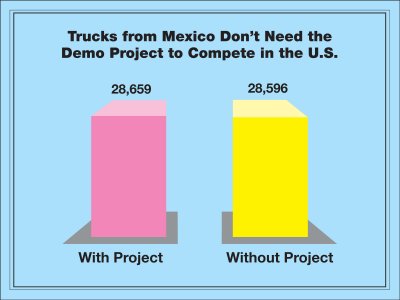
Slide 3:
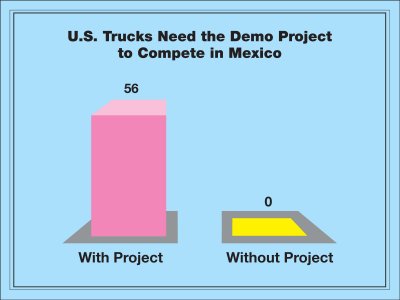
Slide 4:
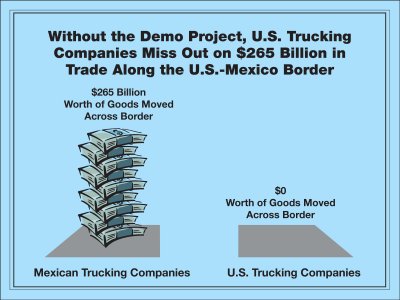
Slide 5:
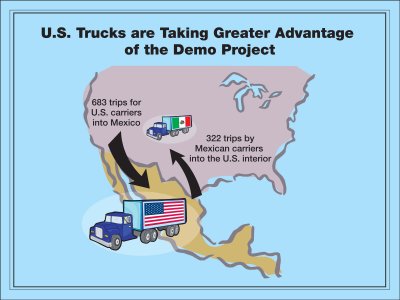
Slide 6:
Tougher Requirements for Mexican
Trucking Companies Operating in the U.S.
Requirement |
United States |
Mexico |
|---|---|---|
Preauthorized Safety Audits |
No |
Yes |
CVSA Decals |
No |
Yes |
Medical Exams by MDs |
No |
Yes |
Immigration Requirements |
N/A |
Yes |
Customs Requirements |
N/A |
Yes |
Cabotage Ban |
N/A |
Yes |
Drug and Alcohol Testing |
Yes |
Yes |
Medical Qualifications |
Yes |
Yes |
English Language Proficiency |
Yes |
Yes |
Hours of Service |
Yes |
Yes |
Driver’s Qualification Files |
Yes |
Yes |
Vehicle Maintenance |
Yes |
Yes |
Size and Weight |
Yes |
Yes |
EPA/Emissions Standards |
Yes |
Yes |
Fuel Tax |
Yes |
Yes |
State Registration Fees |
Yes |
Yes |
Slide 7:
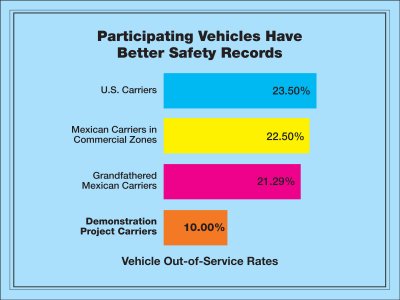
Slide 8:
Consolidated Appropriations Act, 2008
Sec. 733. None of the funds made available in this Act may be used to establish or implement a rule allowing poultry products to be imported into the United States from the People's Republic of China.
Slide 9:
Consolidated Appropriations Act, 2008
Sec. 103. None of the funds made available under this Act may be obligated or expended to establish or implement a program under which essential air service communities are required to assume subsidy costs commonly referred to as the EAS local participation program.
Slide 10:
Consolidated Appropriations Act, 2008
Sec. 136. None of the funds made available under this Act may be used to establish a cross-border motor carrier demonstration program to allow Mexico-domiciled motor carriers to operate the commercial zones along the international border between the United States and Mexico.
Slide 11:
Widespread Support for Cross Border Trucking
San Francisco Chronicle |
The New York Times | Washington Post |
| Wall Street Journal | Chicago Tribune | Investor's Business Daily |
| Dallas Morning News | San Diego Union-Tribune | Arizona Republic |
| San Antonio Express-News | The Seattle Times | The Patriot News |
| The Daily News (Longview, WA) | The Albuquerque Tribune | Ventura County Star |
| East Valley Tribune | Orlando Sentinel | The Herald (Monterey County, CA) |
| Amarillo Globe-News (TX) | The Kansas City Star | The Washington Times |
| Arizona Daily Star | The Cincinnati Post | Waco-Tribune |
| The Herald Zeitung (New Braunfels, TX) | Portland Press Herald/Maine Sunday Telegram | Scripps News |
| International Herald Tribune | Lufkin Daily News | Detroit News |
| Star-Telegram | San Antonio Business Journal | Denver Post |
| Tucson Citizen |
Slide 12:
Widespread Support for Cross Border Trucking
| American Apparel & Footwear Association (AAFA) | American Bakers Association | American Cotton Shippers Association |
| American Farm Bureau Federation | American Feed Industry Association | American Frozen Food Institute |
| American Meat Institute | American Seed Trade Association | American Soybean Association |
| American Trucking Associations | Business Roundtable | Cargill, Incorporated |
| Caterpillar | Cessna Aircraft Company | Chicago Sweeteners, Inc. |
| Coalition of Service Industries | Commodity Markets Council | ConAgra Foods, Inc. |
| Consumer Electronics Association | Corn Refiners Association | Distilled Spirits Council of the United States |
| Eastman Kodak Company | Emergency Committee for American Trade (ECAT) | Grocery Manufacturers Association |
| Hormel Foods Corporation | International Dairy Foods Association | International Textile Group |
| Mars Incorporated | National Association of Manufacturers (NAM) | National Association of Wheat Growers |
| National Chicken Council | National Cotton Council | National Council of Farmer Cooperatives |
| National Foreign Trade Council | National Grain and Feed Association | National Milk Producers Federation |
| National Oilseed Processors Association |
National Pork Producers Council | National Potato Council |
| National Turkey Federation | Nestle Purina PetCare Company | Nestle USA |
| North American Equipment Dealers Association | North American Export Grain Association | North American Millers’ Association |
| Northwest Fruit Exporters | Northwest Horticultural Council | Pet Food Institute |
| Phillip Jennings Turf Farms, LLC | Smithfield Foods |
Sweetener Users Association |
| The Fertilizer Institute | Transportation, Elevator & Grain Merchants Association | Travel Goods Association (TGA) |
| Tyson Foods, Inc. | U.S. Apple Association | U.S. Chamber of Commerce |
| U.S. Dairy Export Council | U.S. Meat Export Federation | U.S. Wheat Associates |
| United Egg Association | United Egg Producers | United States - Mexico Chamber of Commerce |
| United States Association of Importers of Textiles and Apparel | United States Dry Bean Council | US Hides, Skins and Leather Association |
USA Poultry & Egg Export Council |
USA Rice Federation | Washington Apple Commission |
